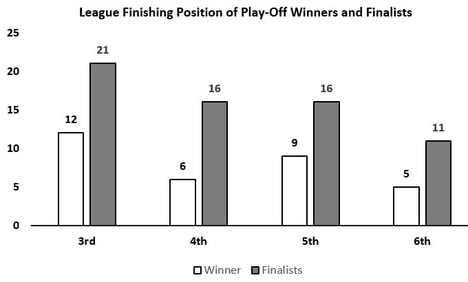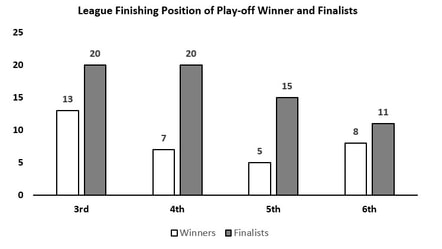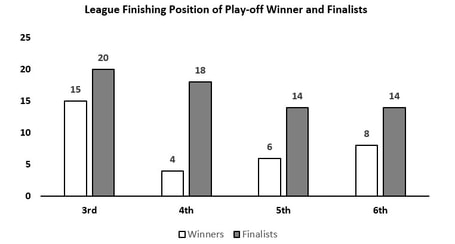We're in the midst of the English football league play-offs. These are some of the most exciting football matches that one can watch – an entire season is on the line. My fondness for these matches goes back to childhood; the unfamiliar scheduling and the high-stakes drama was appealing.
The play-offs were first trialled in 1987, as part of a wider re-organisation of the English league, and have taken place at the conclusion of every season since. This post considers outcome data for 32 seasons. This includes data for the old First Division/Championship play-off from the 1988/89 season* and 33 seasons for the lower divisions (that have changed name many times since due to re-structuring).
Unsurprisingly, the playoff winners are most likely to come from the 1st slot after the automatically promoted teams via the league** (charts below). These higher ranked teams are also most likely to be finalists. For the Championship, on average this team finishes 4 points ahead of the 4th and 5th placed team and 8 points ahead of the 6th placed finisher.
The idea that finishing just outside the automatic promotion spot brings a certain psychological angst, that spills over into the play-offs, isn't borne out in the data. The teams just outside automatic promotion win the play-offs most often and are finalists most often too.
**Note this varies across years and divisions but is kept as 3rd-6th for ease of interpretation - For example, in the 1988-89 2nd division (now Championship) season the places were altered to just include the 3rd to 6th positions. This would later be extended from the 4th to 7th team in the 1990/91 season to allow for an increased number of teams in the first division. It later reverted back to 3rd to 6th and from 2nd to 5th in 94/95 to reduce the Premier league back to 20 teams.



 RSS Feed
RSS Feed